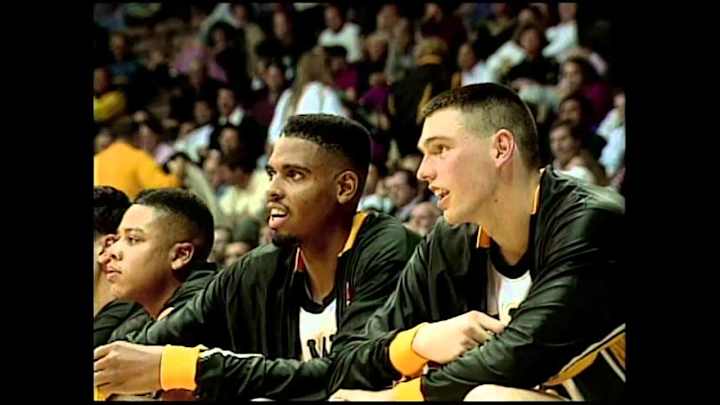Brown: Remembering Chris Street

In this story:
IOWA CITY, Iowa - Things happen, on occasion, that defy explanation.
I was reminded of that on Tuesday, when the Iowa-Northwestern men’s basketball game was postponed because of COVID-19 issues on the Wildcat team.
Nearly 30 years to the day, an Iowa-Northwestern game also scheduled for a January Wednesday night in Iowa City was postponed.
Chris Street, Iowa’s standout junior forward, was killed in an automobile accident on that fateful Tuesday night of January 19, 1993.
Thirty years later, Street was to be honored at that Iowa-Northwestern game. And a one-hour documentary on Street was scheduled to be aired on the Big Ten Network after Wednesday’s game. It ran, as scheduled, after the Ohio State-Nebraska game instead. It was followed by the 1993 Iowa-Michigan game when the Hawkeyes, riding a wave of emotion, beat the Fab Five in the absence of their fallen teammate.
Wednesday’s postponement took me back to several other things that made me ask, is this just an eerie coincidence or something deeper than I can fathom?
Gary Close was an assistant coach at Iowa when we lost Street. Gary helped recruit him out of Indianola High School. True, it was probably the easiest recruiting job of Close’s successful career, because Chris was born a Hawkeye. But the two truly bonded when Street got to Iowa. Close’s phone would ring at home many a night. It would be Street, wanting to get in another workout. Street’s budding career had Close’s fingerprints all over it.
Close’s daughter, Ellen was born on a January 19. Gary was an assistant coach at Wisconsin when the Badgers played at Iowa on Jan. 19, 2013. The Hawkeyes marked the 20th anniversary of Street’s passing by draping his gold No. 40 jersey over the first chair on the Iowa bench.
Flip ahead 30 years. Kris Murray, Iowa’s leading scorer, is named after Chris Street. Close’s son, Sam, is an Iowa basketball manager. On Wednesday, the Hawkeyes were to play a Northwestern team coached by Chris Collins. He had given the Iowa program a good, hard look before deciding to play at Duke for Coach Mike Krzyzewski. When Collins made his official campus visit to Iowa, Street and Paul Lusk were his hosts.
Chris Street has always held a special place in my heart. It goes back to the first time I interviewed him, when I was a reporter for the Des Moines Register. We talked after he committed to Iowa in August of 1988.
He was confident, not cocky. I thought to myself, this is a guy who knows what he wants and is bound and determined to get there. As his career unfolded before our eyes, I knew my initial impression had been correct.
His impact is still felt, 30 years later. Anyone with a connection to Iowa, and many who don’t, can tell you where they were when they heard that Chris had been killed.
I was home that Tuesday evening when I got a phone call from the sports desk at the Register. I hung the phone up, walked into the bedroom and told my wife, “Chris Street was killed.” And then I was run over by a wave of emotion.
I was approached by Mike and Patty Street in 2018 to write a book about their son. As we sat and talked at their kitchen table, we shared stories. And I knew I had to tell them yes.
The Street family granted me full access. There were piles of newspaper clippings tracking his career and passing. And countless sympathy cards, which best painted a picture of the impact Chris Street had on so many people. An impact fueled by the emotion he played with, whether someone watched him in person or on TV. That’s why the book was titled “Emotion in Motion.”
The Streets opened a door to their own emotions as well, as did so many people who played such an important role in this young man’s life. Matt Engel’s Street documentary shows the depth of emotion so many people still carry over his loss. It is a tremendous piece of journalism and a lasting testimony to No. 40.
The Streets and I were united by one goal. We wanted to tell his story for future generations to come. Hopefully, we’ve done that.
